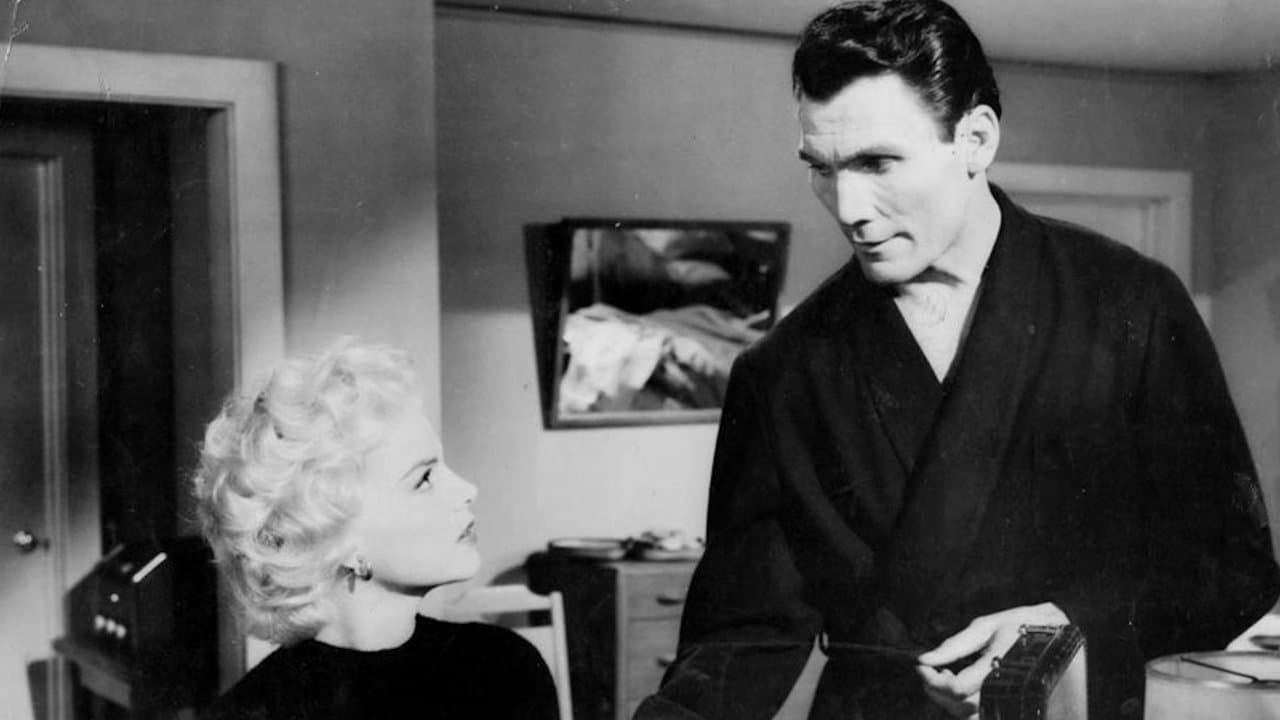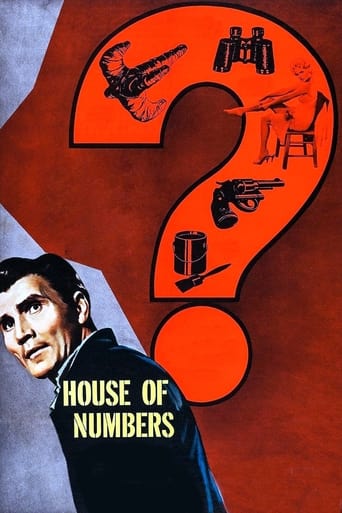

You won't be disappointed!
... View MoreBetter Late Then Never
... View MoreIt is neither dumb nor smart enough to be fun, and spends way too much time with its boring human characters.
... View MoreA terrific literary drama and character piece that shows how the process of creating art can be seen differently by those doing it and those looking at it from the outside.
... View MoreHouse of Numbers (1957)This starts with a clunky, poorly written rush to fill us in on the situation--a brother in jail who needs help to escape. But hang in there. It gets better.The premise is clear early on—Jack Palance plays a man whose brother (also played by Palance) needs to get out of San Quentin. So they plan an escape that involves the first brother breaking into the prison. And so on. Cool stuff.And when it gets going, there is less talk and more action, and frankly Palance is a physically interesting actor (his delivery is always stiff). This is not a great classic by any stretch. Parts are almost filler—scenes from around the real San Quentin (one of the advertised perks of the movie). But there are also good suspenseful aspects watching this plan get underway. Whether it works, I'll not say. Both Palances are good enough to hold it together. The leading woman, trying painfully hard to be a kind of Marilyn, is a drag on the whole thing. A few side characters spice it up nicely. But mainly we have the plot, and the details as we see the clever and rather nutty idea get underway. The improbable daring of the events continues right to the end, with a final twist and "The End" hitting you quickly.The director, Russell Rouse, is obscure (he directed "New York Confidential," which is good), and he probably deserves a lot of blame here because the core idea of the movie is great. And Palance could have risen up a notch with some good leading. One aspect of Palance's performance that is great, for sure, is how he made the two brothers really seem like different characters. They aren't twins, and they look and act different. The music by the soon-to-be well known conductor, Andre Previn, is an example of orchestral excess—it made me even laugh once, with the crash of music for dramatic effect, though the composing has some new qualities that take it musically beyond the great Max Steiner.By half way through there was no way I was going to quit, so if you get into this for awhile you'll be hooked by at least the "what happens" part of it all, and by the location shooting and some good night stuff.
... View MoreGimmicky plot that doesn't work despite the key ingredients. In 1957, Jack Palance was one of the most interesting actors around. His skeletal face and intense manner looked nothing like the pretty boy stereotypes that dominated male leads of the day. So why does this opportunity to play dual roles fall as flat as it does. I'm not sure, but the uninspired pacing of director Russell Rouse fails to generate much needed excitement. Then too, the script is not just confusing but fails to present Palance with a clear concept that can be acted out with his usual intensity. Where there should be a contrast between the bad brother Arnie and the sympathetic brother Bill, Palance ends up playing both in a confusingly similar fashion. That sort of ambiguity may play well with art house audiences, but here it drains the film of much needed dramatic tension. Then too, Barbara Lang as the moll shows why it takes more than a shapely figure and a good dye job to make an actress, even in the Marilyn Monroe-driven 1950's.The film has two things going for it-- filming at unusual San Quentin locations, along with cult actor Timothy Carey in a brief but typically memorable role as Palance's cell mate. Note how real inmates (I think) try to get a moment of fame in the prison scenes, one of which apparently includes the actual mess hall. In a better film, these scenes would have contributed greatly, but here they simply pass without impact. One can only speculate as to the explosive potential of vintage Palance and the incorrigibly oddball Carey confined together in the same cell. Too bad, director Rouse and the writers didn't realize what they had. Just watch Carey's rolling eyes wheel away from whatever the mouth is saying as though they're hooked up to two unruly strangers. A potential clash between the exotics Palance and Carey would have created an exceptional moment for cult admirers everywhere.All in all, the slack direction and sloppy script sabotage what could have been a memorably offbeat B-film.
... View MorePoor film dealing with a brother's scheme to get out of jail. He changes places with his brother who looks like him.Jack Palance as always is intriguing. However, the problem here is that he has such poor written material to work with.Harold J. Stone comes off as a heavy as a prison guard who has larceny in his heart but has the tables turned on him.We see Palance as a sympathetic brother who helped the latter through college.The acting here is so stilted. Even the guy who is hijacked in his car comes off as totally unrealistic. How many times could he say: "Don't hurt me, I have a wife and kids."The ending where the brother turns on the other is not surprising but by this time you're so annoyed with the whole thing that you just don't care much anymore.
... View MoreAs director and screenwriter, Russell Rouse usually had something a little different up his sleeve, at least when he was toiling in film noir. His D.O.A remains one of the best-remembered films of the cycle, but he also contributed The Well, The Thief, Wicked Woman, and New York Confidential each of them at least some distance off the beaten track. His films tended to be less ostentatious than their rivals quieter even (none quieter than The Thief, that dialogue-free experiment).House of Numbers was his last urban crime drama; he would go on to helm a few westerns and, in 1966, the dreadful The Oscar. But House of Numbers shows him in reasonably fine form. Jack Palance plays brothers: Arnie, in San Quentin for killing a man in a fight (he was a boxer so his hands are `lethal weapons') and Bill, who moves to San Francisco to spring him out. His helpmate in this Mission-Impossible-style scheme is Arnie's wife Ruth (Barbara Lang). The scheme is far from simple, involving Bill's smuggling himself into prison for a spell and posing as Arnie (not so far-fetched, since the same actor plays both roles). But things go wrong, such as Bill and Ruth happening to rent a house next to that of a prison guard who knows Arnie, and then falling in love with one another....Though House of Numbers may be the least violent Big-House story ever filmed, Rouse doesn't let the reins go slack. He twists the plot along to its surprisingly sedate conclusion, and brings it off. Maybe the most memorable aspect of the film is Barbara Lang's subdued and touching performance. This blonde stunner's film credits could be counted on the fingers of a maimed hand, and that's both a puzzle and a shame.The score, too is memorable, thanks to André Previn. His galley years in Hollywood, before he left to become a `serious' conductor and composer, were spent on a startling number of low-budget productions, including many noirs. He did them proud. Had he teamed up with a director of auteurist aspirations, like Hitchcock, he might have become legendary for his scores, like Korngold or Herrmann or Webb. (But then, we might not have gotten his opera A Streetcar Named Desire.)
... View More